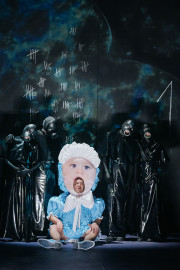Kaspar
Peter Handke’s play KASPAR had its premiere 55 years ago, in the midst of the upheavals of 1968. To this day, KASPAR, which has always stood in the shadow of Handke’s two-years-older play “Offending the Audience”, remains without equal in terms of its poetry and radical form. As far as the ’68 generation was concerned, language had lost its innocence. It stood on trial, charged before the tribunal of history for the crimes of the National Socialists: for the disciplinary measures it had carried into middle-class homes, for the untrue truths passed on from one generation to the next, for the severe boundaries it had drawn for bodies over the centuries. Bodies that reacted with excessive violence. KASPAR addresses the culpability of language.
Thanks to Handke, at that time experiencing an early pinnacle of his artistry, this play also allows us to experience the full power of language and its wonderful capacity for humour and beauty. Handke’s Kaspar is loosely based on the historical figure Kaspar Hauser, an “enigmatic foundling” who spent his childhood in a dungeon and whose first contact with society – and hence with language – was at age 16. Suddenly, he is faced with a group of people introducing him to language and all its facets, forcing it, prompting, repeating, ingraining. It is funny, brutal and poetic – and it holds a surprising criticism of language for the internet age, in which the problem of violence through language has not lost any of its topicality.
US director Daniel Kramer, who staged Tony Kushner’s play ANGELS IN AMERICA at the Akademietheater last season, directs KASPAR.
-
KasparMarcel Heuperman,
-
Einsager*innenLaura Balzer,Stefanie Dvorak, Jonas Hackmann, Markus Scheumann,
| Beschreibung | Information |
|---|














